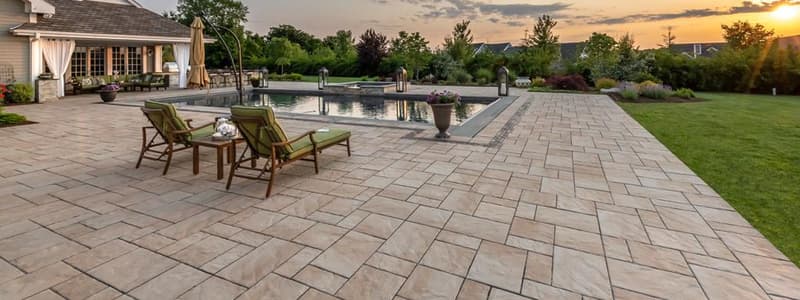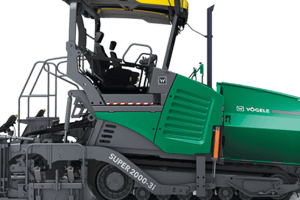Podcast
Questions and Answers
Which paver material is known for its non-slip feature and comes in unique, irregular shapes?
Which paver material is known for its non-slip feature and comes in unique, irregular shapes?
- Limestone pavers
- Bluestone slabs
- Flagstone pavers (correct)
- Brick pavers
What natural stone product is easily accessible in the United States and can be polished to create a smooth, glossy finish?
What natural stone product is easily accessible in the United States and can be polished to create a smooth, glossy finish?
- Flagstone pavers
- Limestone pavers (correct)
- Brick pavers
- Bluestone slabs
Which paver material is known for its dense, fine-grained sandstone composition and can be cut into various sizes and shapes?
Which paver material is known for its dense, fine-grained sandstone composition and can be cut into various sizes and shapes?
- Porcelain tile pavers
- Travertine pavers
- Bluestone slabs (correct)
- Marble slabs
What type of paver is typically used for home projects such as countertops, accent walls, and patio flooring to provide a sophisticated finish?
What type of paver is typically used for home projects such as countertops, accent walls, and patio flooring to provide a sophisticated finish?
Which paver material is known for its unique porous texture and warm, earthy tones?
Which paver material is known for its unique porous texture and warm, earthy tones?
What material is used to make porcelain tile pavers and is known for its durability and resistance to weathering and staining?
What material is used to make porcelain tile pavers and is known for its durability and resistance to weathering and staining?
Which type of paver is typically made of granite, basalt, or limestone and shaped into rough circles or squares?
Which type of paver is typically made of granite, basalt, or limestone and shaped into rough circles or squares?
What material is rubber pavers typically made from?
What material is rubber pavers typically made from?
What is the major advantage of using gravel as a paving material?
What is the major advantage of using gravel as a paving material?
For what type of outdoor project are concrete pavers most suitable?
For what type of outdoor project are concrete pavers most suitable?
What are pavers?
What are pavers?
Where are concrete pavers ideal for use?
Where are concrete pavers ideal for use?
What is the advantage of concrete pavers?
What is the advantage of concrete pavers?
What are the 13 types of pavers based on?
What are the 13 types of pavers based on?
What is a common material used for pavers?
What is a common material used for pavers?
What can pavers be made from?
What can pavers be made from?
What is the composition of concrete pavers?
What is the composition of concrete pavers?
How do pavers differ from other flooring materials like wood or vinyl?
How do pavers differ from other flooring materials like wood or vinyl?
Flashcards are hidden until you start studying
Study Notes
- Pavers are outdoor flooring materials used for hardscaping projects like driveways, walkways, and patios.
- Available in various materials such as concrete, brick, stone, or clay, and come in different shapes, sizes, colors, and styles.
- Exploring 13 types of pavers based on their material.
- Concrete Pavers:*
- Made of a cement and aggregate mixture, molded and air-dried.
- Durable, weather-resistant, ideal for driveways, patios, and walkways.
- Considerations: Cost-effective, various colors and designs available.
- Brick Pavers:*
- Made from natural clay blend, fired in a kiln.
- reddish or brown shade.
- Considerations: Traditional look, requires periodic sealing.
- Limestone Pavers:*
- One of the earliest and most widely used construction materials.
- Natural stone product, easily accessible in the US.
- Can be polished or left with a natural texture.
- Considerations: Varying textures, slip-resistant.
- Flagstone Pavers:*
- Quarried from sedimentary rock deposits, split into thin, flat pavers.
- Non-slip feature, unique shapes fit together like a puzzle.
- Considerations: Durable, natural appearance.
- Bluestone Slabs:*
- Fine-grained sandstone composed of quartz particles and sand compounds.
- Can be cut into various sizes and shapes.
- Considerations: Slip-resistant, durable.
- Marble Slabs:*
- Beautiful and elegant, used for countertops, accent walls, and patio flooring.
- Formed when limestone is exposed to extreme heat and pressure.
- Considerations: Slippery when wet, require sealing.
- Travertine Pavers:*
- Composed of limestone formed by mineral deposits from natural hot springs.
- Unique, porous texture, warm earthy tones.
- Considerations: Slip-resistant, requires sealing.
- Porcelain Tile Pavers:*
- Ceramic materials designed to look and feel like natural stone but more durable and resistant to weathering and staining.
- Made by firing kaolin in a kiln.
- Considerations: Slip-resistant, scratch-resistant, low maintenance.
- Cobblestone Pavers:*
- Popular choice for paving European streets.
- Made of granite, basalt, or limestone, shaped into rough circles or squares.
- Considerations: Durable, classic look.
- Rubber Pavers:*
- Slip-resistant, comfortable, made of recycled rubber.
- Offer shock-absorption properties, safe for kids and elderly.
- Considerations: Cost-effective, may not be as durable as other options.
- Gravel Pavers:*
- Composed of an aggregate of rock fragments.
- Provide a stable, level surface, allow water to drain through.
- Considerations: Cost-effective, require occasional maintenance.
- Granite Pavers:*
- Coarse-grained, light-colored rock.
- Commonly used for countertops, stair treads, and indoor floor tiles.
- Considerations: Durable, slip-resistant, high-end look.
- Plastic Pavers:*
- Cost-effective alternative to traditional paving products.
- Available in several shapes and designs, typically only for aesthetic walkways.
- Considerations: Not as durable as other options, limited lifespan.
Studying That Suits You
Use AI to generate personalized quizzes and flashcards to suit your learning preferences.






